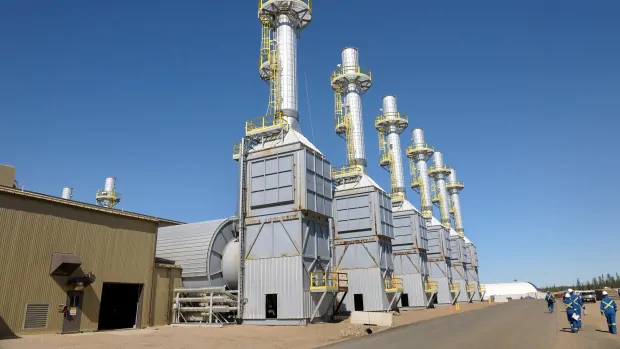Cenovus aims for 'net zero' GHG emissions by 2050

Oilsands producer Cenovus Energy says it’s aiming to achieve “net zero” greenhouse gas emissions by 2050 — and reclaim hundreds of decommissioned wells sites — as part of new sustainability targets announced Thursday.
The move comes amid growing scrutiny of Canada’s oilpatch and its environmental legacy, from green organizations and also investors.
Calgary-based Cenovus says its plan is to reduce its emissions per barrel by 30 per cent by 2030, while keeping flat its total emissions.
The strategy also includes an initiative aimed at boosting the amount of spending it directs toward Indigenous business by an additional $1.5 billion. Cenovus says it will reclaim 1,500 decommissioned well sites by 2030.
Alex Pourbaix, the company’s chief executive officer, says the targets the company has set are intended to “position us to thrive in the transition to a lower-carbon future.”
“I’m confident we have the right business model and talent in place to achieve them,” he said in a statement.
The company says it will do that with a multi-pronged approach including operational optimization, incorporating electricity cogeneration capacity into future oilsands phases, more use of solvent technology to reduce steam needed to produce bitumen, and methane emissions reductions in its conventional drilling operations.
Cenovus says it has reduced its GHG emissions at its oilsands operations by about 30 per cent per barrel over the past 15 years, although higher production means total emissions have increased.
Other oilsands producers on-board
It is the latest in a string of oil company announcements about commitments to improve environmental performance.
Fellow oilsands producer Canadian Natural Resources has also pledged to work toward a zero-emissions target, without giving a specific date, using technology and its carbon trapping and storage operations. It says it has lowered emissions per barrel from its oilsands mining operation by 37 per cent since 2012.
In December, Spanish energy giant Repsol, which has operations in Canada, also announced it would try to achieve net zero emissions globally by 2050.
In September, Suncor Energy said it would spend $1.4 billion to install two cogeneration units at its Oil Sands Base Plant in northern Alberta, thus reducing greenhouse gas emissions by 25 per cent.
Canada’s oil and sector is facing greater scrutiny, especially amid growing climate change concerns.
Last fall, Norway’s largest pension fund removed four Canadian energy names from its investment list and says it will no longer put money in companies that derive more than five per cent of their revenue from the oilsands.
Former Bank of Canada governor Mark Carney, who recently joined the United Nations as a special envoy on climate change and finance, told BBC last month that the financial sector had begun to curb investment in fossil fuels, but far too slowly.
Decarbonizing the economy
Warren Mabee, director of the Queen’s Institute for Energy and Environmental Policy, calls Thursday’s announcement a positive sign that Canada’s energy sector — and Cenovus in particular — are taking seriously issues around climate change and the need to decarbonize the economy.
“Clearly, there’s more and more pressure on these companies to look at their carbon footprint and to start to come up with some real strategies to address those carbon footprints,” Mabee told CBC News.
“I think that the markets are starting to speak louder and louder. I think that consumers are becoming more and more aware of what these issues are. And so any forward-looking company has got to be taking that very seriously.”
Mabee says it seems the company has laid out concrete steps to reach emissions targets that he believes are achievable.
He believes those efforts can also help Canada in its bid to reach its Paris agreement goals. The Paris target requires Canada to cut greenhouse gases produced from 730 million tonnes in 2005 to 511 million tonnes in 2030.
“So if we want to achieve that Paris target of a 30 per cent reduction, and if we want to set ourselves up to be able to do even more as we move toward the middle of the century, we need the oil and gas sector, the energy sector, to start coming up with these solutions.”





